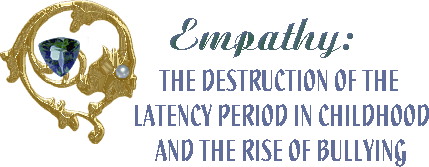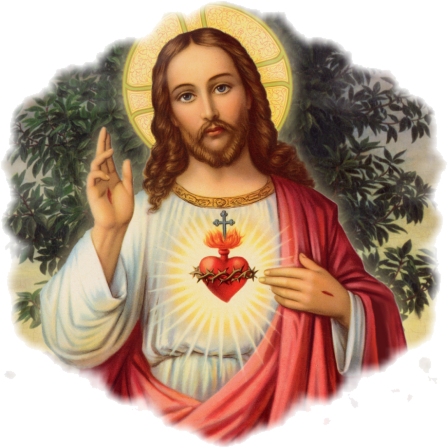

BY PAULY FONGEMIE
February 15, 2014
Feast of St. Claude de la Colombiere,
Confessor of St. Margaret Mary, Saint of the Devotion to the Sacred Heart of Jesus
There is much discussion about the alarming increase in vicious bullying by children, teens, and young adults, the kind of torment that is directed against a peer, whether known personally by the bully or not. The quantity of bullying is outmatched by the quality of cruelty, so savage in some documented circumstances as to be inexplicable. Those who are rightly concerned often cite the social media on the internet and family breakdown and lack of oversight in the government schools as causal factors. While these surely contribute to the brutality out of all proportion in a society where even the poor appear to have so much more than in those in developing countries, they are in fact more of a symptom than a causation.
Why do I assert this?
Essentially the phenomenon we are dealing with is a lack of empathy. Empathy or sensitivity to the dignity and feelings of another human being created in the image and likeness of God, is normally developed in the child between the ages of 7-12, what child development experts call the latency period. The Catholic Church also recognized this phase, more than anyone else in Her development of social doctrine regarding the rearing of children.
What is the latency period in child development, what is the normal emotional awareness and response? This is the phase in the child where he is still unsexualized, that is, he is is not deliberately exposed to sexual stimuli and or discussion. The opposite sex is not the focus as it tends to become in adolescence. It is supposed to be this way. During this period of development, within the family and in the school which must be the representative of the parents - in loco parentis - the child, having his every need necessarily met in his younger years as a baby, toddler and young child, wherein the focal point is self, now begins to learn compassion and empathy for others and the beginning of self-mastery and competence. This is why the age of reason is usually said to be at 7 years. The child has begun to form a conscience, empathy of which is a function of a rightly formed conscience, of being well-adapted. The formation of a right conscience is conjoined with the formation of faith - all men belong to God Who has created them for this purpose. This phase is so critical to the healthy development of the whole human person as a responsible, loving adult, that if it is "short-circuited" in any way, then it is believed it is very difficult, if not almost impossible for a rightly formed conscience that includes compassion for others to occur even with help from professionals. Some experts say that if this phase is disrupted or does not occur properly, that the child is "hard-wired" or incapable of developing a normal adult conscience. This is what occurs with sociopaths. I am not implying that all children are in danger of becoming sociopaths, only that aspects of sociopathology can form to some degree, depending on other factors in a child's life.
What does the Church teach about childhood education that impacts the formative years?
In his encyclical, Christian Education of Youth, His Holiness, Pope Pius XI instructs thusly: [Notes which refer to portions between quotation marks, are not included for brevity's sake [emphasis in bold added.]
This norm of a just freedom in things scientific, serves also as an inviolable norm of a just freedom in things didactic, or for rightly understood liberty in teaching; it should be observed therefore in whatever instruction is imparted to others. Its obligation is all the more binding in justice when there is question of instructing youth. For in this work the teacher, whether public or private, has no absolute right of his own, but only such as has been com- municated to him by others. Besides every Christian child or youth has a strict right to instruction in harmony with the teaching of the Church, the pillar and ground of truth. And whoever disturbs the pupil's Faith in any way, does him grave wrong, inasmuch as he abuses the trust which children place in their teachers, and takes unfair advantage of their inexperience and of their natural craving for unrestrained liberty, at once illusory and false.
In fact it must never be forgotten that the subject of Christian education is man whole and entire, soul united to body in unity of nature, with all his faculties natural and supernatural, such as right reason and revelation show him to be; man, therefore, fallen from his original estate, but redeemed by Christ and restored to the supernatural condition of adopted son of God, though without the preternatural privileges of bodily immortality or perfect control of appetite. There remain therefore, in human nature the effects of Original Sin, the chief of which are weakness of will and disorderly inclinations.
"Folly is bound up in the heart of a child and the rod of correction shall drive it away." Disorderly inclinations then must be corrected, good tendencies encouraged and regulated from tender childhood, and above all the mind must be enlightened and the will strengthened by supernatural truth and by the means of grace, without which it is impossible to control evil impulses, impossible to attain to the full and complete perfection of education intended by the Church, which Christ has endowed so richly with divine doctrine and with the Sacraments, the efficacious means of grace.
Hence every form of pedagogic naturalism which in any way excludes or weakens supernatural Christian formation in the teaching of youth, is false. Every method of education founded, wholly or in part, on the denial or forgetfulness of Original Sin and of grace, and relying on the sole powers of human nature, is unsound. Such, generally speaking, are those modern systems bearing various names which appeal to a pretended self-government and unrestrained freedom on the part of the child, and which diminish or even suppress the teacher's authority and action, attributing to the child an exclusive primacy of initiative, and an activity independent of any higher law, natural or Divine, in the work of his education.
If any of these terms are used, less properly, to denote the necessity of a gradually more active co-operation on the part of the pupil in his own education; if the intention is to banish from education despotism and violence, which, by the way, just punishment is not, this would be correct, but in no way new. It would mean only what has been taught and reduced to practice by the Church in traditional Christian education, in imitation of the method employed by God Himself towards His creatures, of whom He demands active co-operation according to the nature of each; for His Wisdom "reacheth from end to end mightily and ordereth all things sweetly."
But alas! it is clear from the obvious meaning of the words and from experience, that what is intended by not a few, is the withdrawal of education from every sort of dependence of the Divine law. So today we see, strange sight indeed, educators and philosophers who spend their lives in searching for a universal moral code of education, as if there existed no decalogue, no gospel law, no law even of nature stamped by God on the heart of man, promulgated by right reason, and codified in positive revelation by God Himself in the ten commandments. These innovators are wont to refer contemptuously to Christian education as "heteronomous," "passive," "obsolete," because founded upon the authority of God and His holy law.
Such men are miserably deluded in their claim to emancipate, as they say, the child, while in reality they are making him the slave of his own blind pride and of his disorderly affections, which, as a logical consequence of this false system, come to be justified as legitimate demands of a so- called autonomous nature.
But what is worse is the claim, not only vain but false, irreverent and dangerous, to submit to research, experiment and conclusions of a purely natural and profane order, those matters of education which belong to the supernatural order; as for example questions of priestly or religious vocation, and in general the secret workings of grace which indeed elevate the natural powers, but are infinitely superior to them, and may nowise be subjected to physical laws, for "the Spirit breatheth where He will."
Another very grave danger is that naturalism which nowadays invades the field of education in that most delicate matter of purity of morals. Far too common is the error of those who with dangerous assurance and under an ugly term propagate a so-called sex-education, falsely imagining they can forearm youths against the dangers of sensuality by means purely natural, such as a foolhardy initiation and precautionary instruction for all indiscriminately, even in public; and, worse still, by exposing them at an early age to the occasions, in order to accustom them. so it is argued, and as it were to harden them against such dangers.
Such persons grievously err in refusing to recognize the inborn weakness of human nature, and the law of which the Apostle; speaks, fighting against the law of the mind;" and also in ignoring the experience of facts, from which it is clear that, particularly in young people, evil practices are the effect not so much of ignorance of intellect as of weakness of a will exposed to dangerous occasions, and unsupported by the means of grace.

Sadly, to the detriment of at least two generations of public and some private school education, this is precisely what has occurred. The key to understanding just how disastrous this course has been and continues to be is that the latency period no longer exists in practicality, unless one is home schooled, resulting in an overall reduced capacity for empathy and a rightly formed conscience. Now we all know fine exceptions to this general outcome - there will always be factors within an individual's background that militate against the extreme forms of a lack of empathy. Social policy cannot be based on the exception but must be based on the norm for the greater good.
A lack of empathy or a reduced sense of compassion is always accompanied by a loss of innocence that is magnified by sexualization, even prior to engaging in acts that belong only in marriage.
Those well-meaning professionals who want to see an end to bullying, for instance, will cite the social media, etc. Rather than the cause, these communication outlets are more easily used to corrupt because a priori the lack of a good conscience is already absent or so malformed, that the person is predisposed to play the bully. Social media makes bullying more enticing and available, but it is not the cause in of itself. The focus on "sex education" between the years of 7 and 12, rather than defuse childhood sensuality and its perils, stirs them up because at this age the child is only starting to develop competence and self-mastery which includes conscience and empathy. It accomplishes the "short-circuiting" referenced above. Any instruction that bears on relations with the opposite sex in older children is to be conducted under the direct auspices of the parents who know their child best; in fact is is not to be undertaken in a co-ed setting even at home. But since the normal development of the child has already been disrupted, further education in sexuality only compounds the problems we see today, despite any claims from educators to the contrary. This is why we see widespread cheating and dishonor at all ages, the dishonor includes actual peer and social approval for the cheating, etc. This is simply no coincidence.
Not every parent can home school, but if you possibly can manage it, aware of the necessity of sacrifice, I urge you to undertake the education of your children for yourselves. If this is not possible - and I am most sympathetic here - you must strive to band togeher with other like-minded parents to demand curriculum change for every grade level. It will not be easy by any measure for the forces of sexual socialization and political correctness are so entrenched in the mindset of educators and their allies, including some woefully misguided parents, that you will in all likelihod meet with stiff opposition, and a form of "bullying" directed against you, ironically.
If you think you are safe in a "Catholic school", one only has to consider the decline in Catholic higher education where heresy is openly taught along with contempt for the moral teachings of the Church, in university after university. The lower schools are not far behind in this decline all too often. Many parents have told me that they had to remove their children from these so-called "Catholic schools" and home school or put them in the public school where they are already taxed, but pay only once, not twice, hoping to "deprogram" their children after school is done for the day. This last stratagem is reckless, but some parents are so dependent on 2 jobs for bare existence they see no way out. The increase in single parent homes also decreases the possibility for home schooling all too often.
It is the innocence of our children that is at stake, the pure innocence of childhood that is being destroyed from within and when innocence is thwarted at a sensitive, delicate age, empathy is its first fatality, and an inner rage forms, how much depends on each person, of course, but it is this unfocused rage that spills out into various forms of pathological bullying or the mean-spirited, demonized taunting of others whom one no longer is able to identify with as a fellow human being with dignity.
I leave you to ponder the age-old wisdom of the Church, and place yourselves under the mantle of the Sacred Heart of Jesus Christ in all trust, asking for knowledge of the truth that satisfies because it saves, closing with a citation from Archbishop Fulton Sheen, who quotes the poet Yeats:
"While we develop every form of electronic device to protect outer defenses, why are we not concerned with the moral and spiritual disintegration in our homes and on our streets? As Yeats put it":
Things fall apart;
the center cannot hold;
Mere anarchy is loosed
upon the world,
The blood-dimmed tide
is loosed, and everywhere
The ceremony of innocence
is drowned.
DOWNLOAD THE IMAGE PLAIN
 E-MAIL
E-MAIL
HOME--------------------------------------------------------------------------------------------------------------------------------DIRECTORIES
www.catholictradition.org/empathy.htm